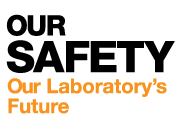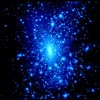



A Berkeley Lab custodian nearly punctured his finger on a pin-mounted hook (for use on cubicle walls) that was discarded in a trash can. This pointed item should have been placed in a "sharps" container, a rigid receptacle designed to protect personnel from getting punctured. A sharp is any device having corners, edges, or projections capable of cutting or piercing the skin, such as needles and razor blades. Sharps containers can be ordered from eBuy (click on "GSS" then select LSS vendor). More details on the proper disposal of sharps and broken glass can be found here.
Go to OurSafety for more on the Lab's safety efforts.
 Safety: Get Free Safety Glasses in Cafeteria Today and Tomorrow
Safety: Get Free Safety Glasses in Cafeteria Today and TomorrowTo assist with the implementation of new Personal Protective Equipment (PPE) policy, the Lab is offering no-cost safety glasses that provide improved coverage and comfort. The Environment, Health and Safety Division has 1,600 pairs of non-prescription safety glasses in four styles, which will be distributed at on a first-come, first-served basis in the cafeteria lobby today and tomorrow from 11:30 a.m. to 1 p.m. Glasses will also be available at Health Services (Building 26) Monday through Friday, 7:30 a.m. to 3:30 p.m. Free prescription safety glasses are also available through Health Services (call x6266 for appointment).
 In The News: Humble Cook Stove Overhauled with ‘User Focus’ Design
In The News: Humble Cook Stove Overhauled with ‘User Focus’ Design[Economist] Depending on which development agency you ask, between two-and-a-half and three billion people use a solid-fuel stove every day. Yet in many parts of the world the stove has barely progressed beyond the Stone Age. After an initial wave of stove design that sought to reduce deforestation through improved efficiency, scientists have turned their attention to minimizing noxious emissions, and have also recognized the way in which stoves are actually used. In the refugee camps of Darfur, the dough for the staple food assida requires vigorous stirring. “None of the stoves we tested had been built with this in mind,” says Ashok Gadgil, head of the Darfur Stoves Project and researcher with Berkeley Lab’s Environmental Energy Technologies Division. More>
 Genome Technology magazine has named the 30 rising young stars who comprise its third annual "Tomorrow's PIs" special edition. Among the designees is Len Pennacchio, with Berkeley Lab’s Genomics Division and the Joint Genome Institute. The investigators were selected for their innovative work and research in a discipline that's part of the systems biology field, as well as for being early in their careers as scientists.
Genome Technology magazine has named the 30 rising young stars who comprise its third annual "Tomorrow's PIs" special edition. Among the designees is Len Pennacchio, with Berkeley Lab’s Genomics Division and the Joint Genome Institute. The investigators were selected for their innovative work and research in a discipline that's part of the systems biology field, as well as for being early in their careers as scientists.
 [New Scientist] It's not just the nature of dark matter that's a mystery — even its abundance is inexplicable. But if our universe is just one of many possible universes, at least this conundrum can be explained. The total amount of dark matter is five to six times that of normal matter. This difference could have been much greater, because the two types probably formed via radically different processes shortly after the big bang. The fact that the ratio is so conducive to a life-bearing universe "looks like a tremendous coincidence," says Raphael Bousso, with Berkeley Lab’s Physics Division. The Lab’s Ben Freivogel is also quoted in the story. More>
[New Scientist] It's not just the nature of dark matter that's a mystery — even its abundance is inexplicable. But if our universe is just one of many possible universes, at least this conundrum can be explained. The total amount of dark matter is five to six times that of normal matter. This difference could have been much greater, because the two types probably formed via radically different processes shortly after the big bang. The fact that the ratio is so conducive to a life-bearing universe "looks like a tremendous coincidence," says Raphael Bousso, with Berkeley Lab’s Physics Division. The Lab’s Ben Freivogel is also quoted in the story. More>
To ensure that non-construction subcontractors, vendors, and guests are performing their work at Berkeley Lab in compliance with our EH&S requirements, all divisions must implement the Non-Construction Safety Assurance Program by Friday, Dec. 19. Program requirements include completion of a subcontractor job hazards analysis and work authorization form, a face-to-face pre-work meeting, and graded oversight of work performed by the subcontractor, vendor or guest. Go here for information on the Non-Construction Safety Assurance Program, or contact Mike Ruggieri (x5440).
Is your department using Webspace? Many Lab employees are using this secure web-based file system for collaboration with other Lab employees and off-site colleagues. If your needs go beyond accessing data others provide (via an e-mail link), consider learning more about the product. Openings are available for the training class on Tuesday, Dec. 16, from 9 to 11 a.m. in Building 90-0026. Registration is required.